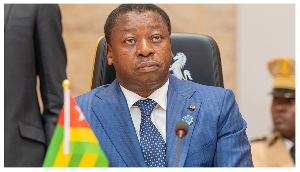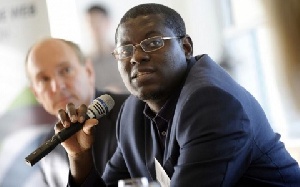- Home - News
- TWI News | TV
- Polls
- Year In Review
- News Archive
- Crime & Punishment
- Politics
- Regional
- Editorial
- Health
- Ghanaians Abroad
- Tabloid
- Africa
- Religion
- Election 2020
- Coronavirus
- News Videos | TV
- Photo Archives
- News Headlines
- Press Release
General News of Tuesday, 29 October 2002
Source: Public Agenda
Central Region: The fading centre of national learning
The Central Region of Ghana has many attractions. The region was 'privileged' to welcome the white man to Ghana and has since been the centre of learning. Since time immemorial the Central Region, has been the anchor of the country's educational system with some of the best second cycle schools in Ghana.
Schools in Cape Coast have produced some of the best brains in the country including the UN Secretary-General Kofi Annan who had his secondary education at Mfantsipim in Cape Coast.
It was also the first region to host the national capital many years ago. Like many an empire, Central Region is on a sloppy hill to decline. "We in the Central Region have realized that the standard of education in the region has been falling steadily over the years," said the Central Regional Minister Isaac Edumadze, when he took his turn at the Meet the Press series in Accra, on Tuesday.
"It is indeed an indictment on the region to have some of the best endowed senior secondary schools in the country and yet its sons and daughters cannot access them through no fault of theirs," the minister said.
According to the Regional Minister, it is a pain in the hearts of many prominent people in the region that having provided the manpower requirements for the development of the country, the Central Region is sliding into decay. "The region has come to grips with this disaster and is determined not to bask in the glory of its distant past," Edumadze said.
Indicators are that poverty has contributed immensely to the falling standards of education in the Central Region. According to the Ghana Living Standards survey, (GLSS) the region is the fourth poorest in the 10 regions of the country after the three northern regions with 48 percent of its indigenes living below the poverty line..
To restore the educational glory of the region, the minister said steps have been taken to identify problems confronting the development of education in the various districts of the region.
"These reports were collated and discussed at a forum involving all stakeholders in the provision of education in the regions." He said the government and the 12 district assemblies in the region are giving scholarships to needy but brilliant students while parents are being encouraged to send their wards to school.
He stressed on one core problem affecting education. The minister said child trafficking is prevalent with many children being sent as far as Yeji to work as fishermen for paltry sums of money.
He said some of these jobs turn out to be deadly. In some cases, children as young as 10 are lured into Yeji and other banks of the River Volta. They are made to dive into the Volta Lake and straighten up nets thrown in by their fishermen patrons to catch fish. There are very disturbing stories of many of the children unable to come back to the surface. The carcasses of the dead kids are then used to attract bigger catches.
The minister intimated that the Regional Co-Ordinating Council is liaising with the Ministry of Women and Children's Affairs to educate the parents against giving their children away and to get all the kids back to the classroom..
According to Edumadze, government has spent a fortune on educational infrastructure throughout the region and asked parents to motivate their children to take advantage of the infrastructure and facilities provided.
Government he said is currently funding a student's hostel, which will accommodate 400 students and an administration block to house the Central administration of the Cape Coast Polytechnic. A network of roads is being tarred as well as the provision of street lights at Cape Coast at a cost of 2.5 billion cedis.
Edumadze said over 23 billion cedis has been released to complete various projects in 22 senior secondary schools in the region.
In a little over two weeks a Priest at Castle Anglican Church lamented that students from Accra had taken over Cape Coast schools because parents in the Central Region are unable to pay bribe to heads of schools. "When you want admission for your child they tell you to go and come. You walk up and down until you are disappointed","the Anglican priest said in a sermon.
One of the major problems in Central Region is the inavailability of water. The coastal area of the region, especially, faces acute water shortages a problem that is taxing the wits of his administration. An annual cycle of acute water shortage hits Cape Coast, Saltpond, Apam and their surrounding towns and villages.
He said the Ghana Water Company's interim measures to restore water to Cape Coast among others include dredging the Brimsu Dam, source of water supply to the municipality so as to increase its storage capacity. The company also intends to raise the height of the dam to increase the storage of raw water.
In the long term, an alternative source of water is being considered to draw water from the River Pra at Beposo, the border town with the Western Region to be either pumped to Brimsu for treatment or treated at source and pumped to Cape Coast.
"I am happy to report that invitations to consultants to do detailed feasibility studies of the various options are already out." "Some companies have sent in letters of interest covering the implementation of the third option mentioned above on a turnkey basis," Edumadze said. These letters according to him are receiving attention at the Ministry of Works and Housing.
The minister said there are major construction efforts at the moment to link five rural communities to quality systems, including solar pumping systems, impounded catchments and the main transmission network of the surface system for communities in the salinity belt.
"You will agree with me that one cannot over emphasize the fact that water and good sanitation are vital components for good health hand productivity," Edumadze said. "An EU investment fund to the tune of 15 million Euros will be made available for the provision of a large scale water supply scheme to 45 small towns in the Central and Western regions.
Edumadze told the media that the regional health directorate is re-organizing its structures to be able to provide quality service at all delivery points
Central Region which has a population of 1.5 million has seven government hospitals, one quasi government hospital, four mission hospitals, 36 government health centres, 17 community initiated clinics, over 65 private clinics and maternity homes as well as 800 outreach points that provide health services in the rural communities.
One disturbing statistics for a region that pioneered political agitation in the country is that beside the three northern regions, the Central Region has the highest rate of under five mortality per 1000 live births in the country. The incidence of HIV/AIDS is also having a devastating effect on people especially in the mining communities.
Other diseases that plague the region causing several deaths include malaria Anemia Diarrhoeal diseases and hypertension.
It is ironical that Central Regions main contribution to national resources, its tourist attraction is also the main contributing factor to the high incidence of HIV/AIDS especially among the fishing communities.
The Minister said in spite of achievements in primary as well as maternal health care, the health indices in the region, continue to paint a poor picture. The doctor patient ratio is 1:2,841.
The Out Patient Department attendance per capita for the year 2001 stood at 0.41 which was lower than the national figure of 0.5 percent. "This meant that only 40 percent of the population consulted at government and mission facilities in 2001."
On poverty reduction, the Regional Minister said District Assemblies in collaboration with the Central Government agencies are putting in place policies and programmes designed to alleviate the poverty of the vulnerable groups in the region. "Under the Ghana Poverty Reduction projects /Social Investment Fund, five districts in the region are undertaking various projects including the construction of three unit teachers Quarters rehabilitation and the completion of classroom blocks among others."
He said by December 2003, a total of 18 billion cedis would have been spent on projects in the communities.
"It is hoped that this would go a long way to reduce poverty," Edumadze said.
According to the minister, there has been a progressive increase in the number of telephone lines available for clients. Seven out of the twelve district capitals have access to one of the telecommunications systems available.
He said available statistics show that telephone lines have increased. "In 1992, Cape Coast had 1000 lines on the Analogue Stranger. This improved to 2000 lines digital in 1996 and as at September 2002, the region has total lines of 8221 with an installed capacity of 14,000 lines."
"The improvement in telephone facilities has greatly enhanced communication within the region which is also a boost to the tourism industry."
He said towns like Dawurampong, Elmina, Fosu, Mankessim, Saltpond, Bawjiase, Komenda, Abura Dunkwa, Ajumako, Apam, Asikuma, Senya Beraku, Twifo Praso and Kasoa would be covered by the year 2003.
On the road sector, Edumadze said in order to open up the region for agricultural activities particularly, the transportation of people and food, the department of feeder roads has been working an all feeder roads across the length and breadth of the region.
He said since last year a total of 37.1km of road has been re-gravelled at a cost of 207 billion cedis while 28.4 km have been rehabilitated at 523 million cedis.
In addition, some 888 km of road has undergone routine maintenance at the cost of 1,035 billion cedis. New contracts have been awarded to construct 114.85 km of road at the cost of about eight billion cedis.
In addition, several roads are being rehabilitated under various donor-assisted programmes. Since January 2001, routine maintenance works have been undertaken on almost all trunk roads in the region.
He said under the periodic maintenance programme two projects were awarded on contract at about four billion cedis "They are the resealing of Ayanfuri-Diaso Road and rehabilitation of Cape Coast Elmina Town Roads Phase III.
"One cannot talk about Highways in the Central region without mentioning the proposed Mallam-Yamoransa road," Edumadze said.
The minister told the gathering that construction of the Mallam -Yamoransa proposed asphalt road would start before the end of the year. President John Agyekum Kufuor is in Japan to negotiate an $80 million Japanese grant for the construction of the road which has been in the country's national budget for years.
The Central Region, one of the oldest regions in Ghana, has a landmass of approximately 9826 km representing 6.6 per cent of the total land mass of the country.
It has a coastline, of approximately 168 kms.
It has the famous Cape Coast and Elmina Castles as well as many forts. It also has the famous Kakum Fortest Resort, with its walkway, one of the major tourist attractions in the world. Cape Coast and Elmina host the world famous Panafest, a historic re-enactment of the slave trade.
The main pre-occupation of the people is farming and fishing. Fishermen in the Central Region contribute land about 40 percent of the nation's marine fish.
Asked whether women who lost their businesses in the recent fire outbreak at a market in Cape Coast have been given assistance, the minister said the Ministry of Women and Children is helping to provide funds while temporary sheds are being provided for the women.










